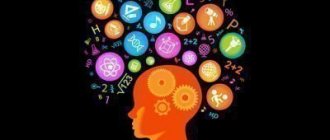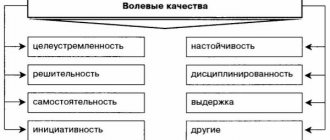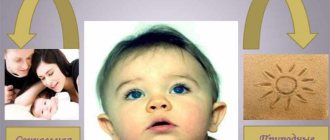A person’s awareness of himself is inextricably linked with the term “self-knowledge.” People's understanding of who they are in life begins at a fairly early age, culminating in the teenage years and young adulthood. The older a person gets, the greater his desire to learn great things; the brain requires constant nourishment in the form of new knowledge, impressions, discoveries and other things.
This is exactly what happens when the period of individual self-awareness begins. However, importantly, self-knowledge always entails a certain responsibility, which stems from social status, and, accordingly, new responsibilities appear. Also, the usual routine, daily affairs can change very much, the “whirlpool of events” of recent life begins to be perceived by a person from the other side, not so seriously, often he even forgets about them, completely devoting himself to a new, more interesting activity for him. And even at this moment, when the awareness of his own “I” comes, he, remembering the past, understands that only a small part is missing to feel the real taste of life. It is quite possible that it was for this reason that a person began to get bored, the events happening around him ceased to please him, they turned into those very ordinary and predictable bits that happen to all people.
Definitely, for some, such a pattern of events can be acceptable, relatively favorable and stable: the individual is recognized by those around him, his friends, acquaintances and colleagues, everything is measured and goes on as usual, there is support. But, despite all the positive components of such a life, a person who has entered the phase of realizing himself as an individual understands that something in his soul is clearly missing, and is tormented by some strange feeling that does not allow him to live in peace.
Even if a person is surrounded by the most famous people, his life is full of unique events and interesting acquaintances, or if the experience of communication in a social environment is simply incredibly bright and beautiful, this does not guarantee that the individual will feel happy. For complete happiness, his soul requires inner strength (in other words, the work of the mind and consciousness), which will push him to new achievements, constant development and the opening of new horizons of knowledge. This is the most important component of what allows you to carry out your plans correctly and feel calm at the same time, it cannot be seen, it is hidden from others, but, nevertheless, plays a vital role in self-knowledge. Inner strength helps people realize their plans and projects; it serves as a source of inspiration for creativity and is the embodiment of the brightest side of human existence.
This is what helps a person overcome difficulties that arise along the path of life, to gain confidence in his own abilities when others do not understand or even do not accept him. We can say that this is a kind of internal pulse that supports life and opens the entrance to the repository of countless knowledge. It is important to be able to use the Absolute, to find the key to it. Each person is unique, and the world that is hidden from view can be much wider than it seems at first glance. Self-knowledge helps to understand this.
Basics of self-knowledge and self-development
Self-knowledge always has its own direction, the purpose of knowledge. What does a person study throughout his life? W. James identified 3 main areas:
- Physical personality - includes the bodily shell and everything connected with it (appearance, body organs, health).
- Social personality - arises as a result of understanding and recognition by other people of the personality of another person.
- Spiritual personality is the essence of a person on a spiritual level, the characteristics of a particular individual.
There is also an interpretation of human nature as a biosocial creature. There are social and biological levels. V.V. Stoletin proposed the following classification:
- Biological individual (has a special nervous system, body structure, body characteristics),
- Social individual (emerges in the process of studying the surrounding world, skills and knowledge of humanity),
- Personality (builds his own path in life, makes choices, knows how to coordinate a pattern of behavior).
Self-knowledge is carried out at all levels. Moreover, a person becomes simultaneously the one who studies and who is studied. “I” can change in time - “I am now”, “I was”, “I will be”. At the same time, there are certain relationships between the object and the subject, namely, self-knowledge at the beginning, self-control, self-regulation - as a result of the results obtained.
The basics of self-knowledge and self-development presuppose a clear relationship between concepts.
- Introspection;
- Self-analysis;
- Comparison with others (ideally with yourself);
- Setting goals for the future;
- Self-development.
The theory of self-development is presented in more detail in the works of Rogers.
The result of self-knowledge. The process of self-discovery
In the process of self-knowledge, any person becomes a sadhu to a certain extent, because he learns through personal experience. Knowledge gleaned from various sources is applicable in practice; as a result of acquiring new experience through spiritual self-improvement, a person reaches a higher level of self-awareness. He not only better understands the laws of the world and interaction with people, but he himself increasingly feels like a part of this world, inextricably linked with all living beings and nature.
It is not without reason that one of the goals of the meditation method is merging with the Absolute, dissolving in it. A person understands that there is no loneliness in life, everything is interconnected. Each part of the universe depends on the whole, everything is in everything. The process of self-knowledge logically leads to this conclusion. You can understand this through logical reasoning, supplemented by spiritual insights gained through the experience of meditation.
Books for self-knowledge
To illustrate all of the above, a selection of books on the topic of self-development will be given here, which can be used both for independent practice of meditation and yoga, and while continuing to practice under the guidance of a teacher. For those who are just embarking on the path of self-improvement, we can recommend reading these books, and perhaps they will become a starting point for you on the main journey of your life - the road of self-discovery.
- Patanjali "Yoga Sutras"
- Sutras of Buddhism,
- Sutra on the Lotus Flower of the Wonderful Dharma,
- Swami Vivekananda "Raja Yoga"
- Paramahansa Yogananda "Autobiography of a Yogi"
- Swami Sivananda "The Power of Thought"
- Swami Sivananda "The Science of Pranayama"
- Sri Chinmoy "Meditation"
- Mahasi Sayadaw "Satipatthana Vipassana Meditation".
The hardest thing is to know yourself, the easiest thing is to give advice to others
Thales
Personality orientation in the works of C. Rogers
Rogers is considered one of the best psychologists of the last century, he founded the psychology of humanism. His concept is based on the individual’s desire for actualization; he identifies the following concepts:
- “Real Self” - includes a person’s awareness of thoughts, values, and attitudes in life.
- “Ideal Self” is a set of ideas about how a person sees his future, what he strives for, and his life experience.
- “Social environment” - includes values and norms, behavioral characteristics inherent in a person’s social environment.
If there are discrepancies in life between the real and ideal state of a person and his implementation in society, mental disorders, neuroses, anxiety, and poor adaptation in society arise. To be in harmony with your Self and achieve an ideal state, you need to gain freedom, learn to listen to your inner voice, and act based on your experience and understanding of life.
Usually, problems arise in a situation where a person lives according to the rules of society, trying not to stand out from the crowd, forgetting about the “Ideal Self”. Rogers, working as a psychotherapist, believed that his task was to reveal the potential of the individual, to help determine and gain freedom through self-knowledge.
His “theory” found its application in pedagogy.
Key rules in the work of a teacher
- pedagogy should contribute to the formation of a healthy and adequate personality, promote personal growth;
- the source of development and growth lies in the person himself, only through comprehension and personal experience, responsible choice is it possible to learn and self-improvement of the individual;
- personal growth and development is impossible without understanding and accepting one’s essence. Respect for yourself and your inner world allows you to take risks and reveal new facets of your personality.
Rogers assumed that self-knowledge and self-development of students would be important components of the pedagogical process. The ideas of this psychiatrist will also be useful to parents in the process of raising a holistic and healthy personality.
Basic qualities of a teacher
- Trusting relationship;
- Stimulate students' internal motivation;
- Share experience, provide assistance in difficult situations;
- Be sensitive to the child’s emotions and feelings;
- Be active in relationships, express your emotions and experiences;
- Understand and know yourself.
Of course, teachers are not always able to find time for each student and promote the full disclosure and development of their personality, so this question applies more to parents, who must know and understand their child and help him develop. Each person in the process of his life asks questions of finding himself, his purpose, which is important for further development and self-improvement. “Know yourself and you will know the world,” the sages said.
Need for self-knowledge
Why is self-knowledge necessary? For what purpose do people ask questions about the true meaning of life and other eternal values? What will help a person understand himself and others? All these questions are directly related to the individual’s desire to learn something more than he knows and to know his own “I”.
The meaning of life is one of the main questions to which everyone will have their own answer and which is brought to the fore (without deep self-knowledge it is impossible to understand this).
Periodic meditation and yogic practice are ways that provide new opportunities for self-knowledge. They help in development and raising the spiritual level. The modern era has somewhat changed these disciplines, bringing to the fore the physical strengthening of body and spirit.
With a correct understanding of the true principles of meditation and yogic practice, you can combine asanas that help strengthen your spirit and health in general. The duality of the world - the division into spiritual and physical components - does not mean that they cannot be united. Just the opposite. The harmonious reunification of these two aspects has a beneficial effect on health (in this case, it is necessary to follow the laws described in the previous topic).
Developmental psychology A. Maslow
Maslow's psychology is also humanistic in nature. He paid great attention to research and identified the main qualities of a self-actualized personality, such as: independence, creativity, philosophical humor, the need for solitude and others.
He believed that humanity is on the threshold of a new psychology, which will allow people to fully reveal their potential and abilities, considering a person as a single and integral mental system. Self-knowledge and self-development of the individual underlie theories of the formation of this personality.
Maslow's Key Findings
- Each person has a special original nature, which is received at birth.
- A person develops throughout life and can develop the data that he received initially. At the same time, the environment (family, school) significantly influences further development.
- Nature has given man the presence of instincts and desires, but over the years, “voices-impulses” reduce their strength as a result of receiving education and total control over oneself. It is these voices that help determine what exactly a person needs, what arouses interest, what he is capable of, and not just what meets the norms and rules of society.
- Personality characteristics may be similar for different individuals, or they may be unique, with their own characteristics. Everyone has needs for love, respect, understanding, and there are personal properties and abilities.
- Human nature is studied both by science and by man himself, using self-knowledge and psychiatric methods.
- Most of the internal, deep thoughts and instincts are suppressed by us and pass into an unconscious form as a result of constant fear, fear of condemnation.
- The inner strength of human nature still remains, periodically makes itself felt, and provides an incentive to develop and find oneself.
- The basis of a person lies in what was given initially; it is important to be able to understand and accept oneself. Moreover, in choosing on the path of life, the main criterion should be the opinion of the individual, not society. Personality is dynamic and tends to develop throughout life.
- The inner essence of a person can be subjected to difficult tests, misunderstandings, and feel rejected in life. Often this leads to real illnesses on a mental level. Difficult situations are considered to be the loss of personality, one’s peculiarities, defining properties, when there is no opportunity to achieve one’s projection, a representation of one’s Self.
- Inner strength is initially positive, the main thing is to learn to use it for good, to stimulate the development of creativity, kindness, altruism, and the ability to love.
Secondary qualities
- Conscience or guilt is an indicator of a person’s correct behavior; it is compared with internal attitudes and values. It is worth listening to your conscience, it will show the way to find your true Self.
- Accepting and loving yourself as a person is necessary for a full and healthy life!
- Self-knowledge is the only, main way of personality development.
- Self-knowledge and self-development require significant efforts of the individual.
- It is important to understand the impact of defense mechanisms - regression, defense, self-preservation. By studying psychiatry, you can understand that realism is also needed in life, since false optimism ultimately leads to disappointment in life.
- The theory of free upbringing assumes that the child himself feels what is for his good; he should be given more freedom of choice and action, and not constantly driven into the framework of requirements.
- Only by following the path of understanding and accepting one’s essence, purpose, and satisfying the needs of the individual, one can become a real person and reveal one’s potential. First of all, we are talking about spiritual needs.
- It is important to remember that without difficulties and disappointments . Therefore, a child must be taught to endure the difficulties of life, while the love of parents and their support is the basis for the formation of a strong personality. Abuse of guardianship can lead to infantilism and inhibit the development of willpower.
- A mature personality is distinguished by a type of cognition . D-cognition and B-cognition are distinguished. Moreover, D is selfish , aimed only at one’s own needs, and D is selfless , the ability to do good, to take care of others. The vector of attention of a person with D-cognition is directed more to the outside world than to purely personal interests.
- For a normal life, a person needs a system of values , his own coordinate system, which will allow him to exist in this world. To create such a system, it is important to study yourself, understand goals and motives, what is good and bad, what has a positive impact on your own dignity.
- A person who can be friends with the unconscious level is often inclined to creativity, and aesthetic education should be the basis of education , psychology and all life.
- An important task becomes - to be above ordinary human problems and troubles , to have a simpler attitude towards life, to form a real and healthy perception of life.
Thus, Maslow’s theory involves the search for one’s inner core, self-acceptance and personality development, harmony with the world around us.
Structure of consciousness
What is the structure of the human psyche, the structure of his consciousness? There are a very large number of theories on this matter. The most popular theory is the theory of psychoanalysis , the founder of which is considered to be Sigmunt Freud. From the point of view of this theory, the human psyche (personality) can be divided into 3 parts :
- conscious;
- unconscious;
- Super-ego.
The conscious is the part that is aware of itself. This is the real Self.
The unconscious is an area of the psyche that is expressed in dreams, various fears, nervousness, that is, in what is not conscious. This is I-It. This is that part of the psyche that controls, in many ways, the whole of life, mental and physical health, but at the same time that which is impossible to know and realize. The unconscious does not think verbally, like the conscious part, but thinks in specific images. Words are translated into images.
The super-ego (or super-ego) is a set of cultural prohibitions and norms that make a person a cultural, civilized social being. This is what allowed Sigmund Freud to say that culture is a set of prohibitions that has a repressive function in relation to society. In other words, culture comes into conflict with the unconscious. If the unconscious can be defined as a set of biological instincts and drives, then the super-ego can be defined as a set of cultural prohibitions and norms. This is what comes into conflict with a person's natural desires.
The structure of self-awareness , which represents the unity of three components, is also common in science
- cognitive;
- affective;
- behavioral.
The cognitive component of self-awareness is the individual’s knowledge of himself. At first, this knowledge is random, chaotic, reflecting only human behavior in specific conditions of communication and activity. Then, these individual situational information about oneself are integrated into a holistic and adequate understanding of one’s own “I” as a subject different from other subjects.
The affective, or emotional-evaluative component of self-awareness includes an emotional attitude (experiences of various emotions) that accompanies self-knowledge, as a result of which self-attitude is formed. The combination of knowledge about oneself with one’s attitude towards oneself forms a person’s self-esteem .
The behavioral component of self-awareness (self-government) shows how self-awareness is manifested through actions and actions that a person carries out in accordance with his self-image. These include the effective-volitional and effective components of self-awareness, the result of which is self-regulation and self-control.
Psychology of Rubenstein
Self-knowledge and self-development of a person occurs in the process of communication with other people, so a person realizes his characteristics and works on personality characteristics. A person’s character is partly an innate thing associated with the type of nervous system, and partly acquired through life and accumulated experience.
To some extent, the study of character is related to Maslow’s theory, since a characterless person does not have a rigid value system, but a person with a strong character clearly understands his purpose and is confident in his coordinate system, adheres strictly to his line of behavior. The concept of “personality” arises as a result of self-awareness of one’s “I” and one’s actions.
Self-knowledge
Self-awareness arises as a result of human development, mastering new knowledge, understanding one’s capabilities, and managing physical processes. Independence develops in the process of mastering speech and service skills, and later manifests itself in the ability to set tasks, goals, and find the main direction for the development of one’s personality.
Self-knowledge and self-development of the individual are important components in a person’s life; these processes are clearly visible in adolescence, when many questions arise before the individual. A person determines his purpose in this world, the abilities and capabilities of his “I”. These are the first attempts to understand yourself.
Each person has character traits and personal qualities that distinguish him from others. Understanding oneself leads to the formation of personality, awareness of the need for changes in certain directions, and the establishment of one’s own principles of life.
A personality is a person with his own worldview, a clear position in life, which arose as a result of great conscious activity, understanding of himself and life in general.
Individuality - a bright, unique person
Personality is a more global concept, and its formation requires quite significant efforts, attention to this issue and determination.
Such a person has his own characteristics, a “handwriting”, and consciously distinguishes himself from the general mass of people, which presupposes independent thinking and the presence of willpower. At the same time, the depth of personality is determined by the richness of the inner world and relationships with people.
Self-isolation leads to devastation of a person, although to a certain extent it is necessary for carrying out internal work and understanding one’s essence. A personality feature is the ability to look at the world from the outside for a more complete understanding of processes.
A developed person also helps others in the process of self-development. A real personality cannot cause indifference; there can be friends or enemies. Such a person always has strength and an active beginning. Self-awareness develops along with a person throughout life; self-reinterpretation occurs in connection with new experiences.
Each person goes through the process of understanding life, asks himself questions and finds answers, understanding what is most important for him and brings value. Accumulated experience and understanding of life leads to the formation of wisdom. Personality is created and built by a person throughout his conscious life, each person develops in a special way.
It is very important to carry out self-knowledge and self-development in a temporary period and ask questions: what was I like? - what am I? - what do I want to be? However, it is important to understand that a person needs to develop his existing potential, and in the process of labor and creation of something, the personality grows. There is a great relationship between a person and his result of activity.
Personality
A person is always of interest if he can create something significant and it is clear that this is not the limit of possibilities. The development of personality over time can be tracked through human activity, in which it manifests itself and constantly develops.
A person’s characteristics are not always at the forefront of actions, but can also be a consequence. And abilities develop as a result of constant practice; the more attention a person directs to a certain area, the higher the likelihood of success in it and achieving high results.
Each person has his own life story, which can be reflected in an autobiography or resume; they will contain data about the person’s training, work, achievements - thus, the relationship of human development through activity can be traced.
In order to become a historical figure, you need to do things, create creations that will be in the public domain and go down in the history of society.
The beginning of the path of self-discovery
The initial stage of self-knowledge is the ability to hear yourself, your inner voice. This is an important skill, without which it is impossible to know your deepest feelings and aspirations. When thoughts appear in your head, you need to sort them: what kind of thoughts they are and who they belong to. Often people are visited by thoughts imposed by other people's opinions and life experiences, which have nothing to do with reality.
You should also listen to your feelings. You need to ask yourself the question: how do I feel at this moment - good or bad? Sometimes the human ego interferes with such a process and dictates incorrect answers. The ego is a mechanism that protects a person from everything new and incomprehensible. Through the prism of our own ego, we perceive the surrounding reality. Ego is everything that is imposed from the outside, the experience that we receive throughout life.
Basics of self-development and characteristics
The basics of self-development presuppose that a person has the ability to shape his life and achieve his tasks and goals. In addition to activity, this process is also influenced by human activity. He can be socially active (initiative, executive) or socially reactive (impulsive, passive). Social activity goes through the following development paths:
- Standard level : schoolchildren, imitation, repetition of actions.
- Normative-personal - the teenage period, one’s own outlook on life and attitude to certain issues appears.
- Personally productive, productive and creative - an adult who makes a contribution to social life, creates innovations, modernizes the old, introduces elements of creativity into the process of life.
Indispensable conditions for self-development are initiative, and later - consciousness and independence. Social activity contributes to the development of abilities to make one’s own choice of development paths along the path of life, and responsibility for one’s actions appears. Development is impossible without achieving the necessary level of self-awareness, understanding and analysis of one’s personality.
The foundations of self-development directly depend on a person’s inner world and his analysis of real life and the situation at a given stage. The inner world is unique and is partly a reflection of the outer world. There are also suggestions that it develops throughout life, together with the personality itself, under the influence of the surrounding reality.
There are several stages of self-development
- revitalization (the child learns to communicate, understand his individuality),
- animation (the child masters the outside world),
- personalization (learning the rules, norms of life with mentors and understanding one’s role in creating a life story),
- individualization (in the process of communication, an idea of one’s personality is formed, characteristics are revealed, and the need for introspection and responsibility for oneself arises),
- universalization (a person goes beyond his individuality, unity with superhuman values, faith or spirituality appears).
The foundations of self-development lie in a person’s desire for self-improvement, improving his self throughout his life.
Values in self-knowledge through yoga practice
The first stage - the pit - contains the following rules:
- satya - only truth and truth;
- aparigraha - partial renunciation of worldly goods;
- ahimsa - condemnation of violence in any of its manifestations;
- brahmacharya - non-promiscuity;
- asthenia – stealing is bad.
Second phase:
- santosha – modesty;
- svadhyaya - reading primary sources;
- shauchya – purity (both internal and external);
- isvara-pranidhana - ideal;
- tapas – self-discipline, self-restraint.
Conclusion
We can conclude that a person is the creator of himself and his own happiness. Self-knowledge and self-development are indivisible and inextricably linked; throughout the entire life journey a person realizes and relates himself to other people, communicating and participating in joint activities.
Development involves the pursuit of one’s “Ideal Self,” which is unique for each person. That is why it is important to understand and accept your essence, realize your strengths and weaknesses, and learn to set goals and objectives for the future. Personal self-improvement occurs on an ongoing basis, as a result of the application of willpower and the desire to develop.
We wish you to live in harmony with yourself, develop and achieve the highest results!
Discovering love on the path of self-knowledge
Love is the main driving force that gives birth to life. Man is born for love. His main goal and mission on Earth is to learn to love. Love is the key to many doors, it gives understanding to many aspects of human life. Love is inseparable from a person; it flows like a river through the world and all living beings that inhabit it. It is the basis of existence, not distorted by fictitious values and ideals.
To experience this feeling, you must go beyond the ordinary, become more aware and deep. It should be recognized that without love the meaning of life is lost. Without it, humanity cannot exist.
Techniques for using meditation
Meditation is a method of perceiving reality, realizing the depth of the inner world. It helps to balance the mind and body, achieve inner harmony and tranquility. To do this, there are various methods of meditation, thanks to which all chakras are worked on. Meditation can take place with music or in complete silence. Indian spiritual mentor Osho argued that any activity can be meditation. An important rule is to have a high level of awareness and presence in the current moment.
One of the most popular ways to get rid of unnecessary thoughts and emotions is a 15-minute practice. During this meditative practice, all negative manifestations of an emotional and physical nature are released.
During the process of meditation, the subconscious is activated, thoughts become light and bright, and inner freedom is felt. The duration of such meditation should be calculated individually, based on the emotional state. The average course duration is from 10 to 12 days. If during meditation a person feels comfortable and relaxed, and after finishing it observes changes for the better, then the duration of the course can be increased.
What does self-development consist of?
There are a large number of elements of self-development, but we will highlight the most important and valuable of them:
- self-knowledge;
- self-awareness;
- increased self-confidence;
- improving learning skills;
- increased self-esteem (or decreased if it is too high);
- development of strengths and skills;
- developing skills needed for a career;
- improved health;
- study and application of methods of self-realization;
- increasing social status;
- fulfillment of aspirations;
- creation and implementation of a personal development plan;
- increasing social intelligence;
- increasing emotional intelligence;
- time management.
When we talk about self-development, it should also be said that mentoring is included in it. If you have mastered teaching techniques and are able to influence students in such a way that they progress as individuals, then you yourself are growing.
In addition to improving yourself, self-development comes through practice and research:
- Practice is expressed in the search for personal development methods, training programs, assessment systems, tools and techniques.
- As an area of research , topics of self-development appear in journals, books and websites in the fields of education, management, and economics of human development.











